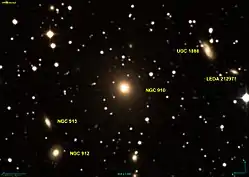NGC 910
NGC 910 is an elliptical galaxy in the constellation of Andromeda. NGC 910 was discovered on October 17, 1786 by the German-British astronomer William Herschel.[5][6][7] It is the brightest galaxy in the cluster Abell 347.[2]
| NGC 910 | |
|---|---|
 DSS image of NGC 910 | |
| Observation data (J2000 epoch) | |
| Constellation | Andromeda |
| Right ascension | 02h 25m 26.772s[1] |
| Declination | +41° 49′ 27.50″[1] |
| Redshift | 0.017614[2] |
| Helio radial velocity | 5234 km/s[2] |
| Distance | 213.5 Mly (65.46 Mpc)[3] |
| Group or cluster | Abell 347 |
| Apparent magnitude (V) | 12.25[4] |
| Apparent magnitude (B) | 13.26[4] |
| Characteristics | |
| Type | E[2] |
| Other designations | |
| UGC 1875, MCG+07-06-014, PGC 9201[2] | |
See also
References
- Skrutskie, M. (2006). "The Two Micron All Sky Survey (2MASS)". The Astronomical Journal. 131 (2): 1163–1183. Bibcode:2006AJ....131.1163S. doi:10.1086/498708.
- "NGC 910". SIMBAD. Centre de données astronomiques de Strasbourg. Retrieved 2020-05-25.
- Tully, R. Brent; Courtois, Hélène M.; Sorce, Jenny G. (2016). "Cosmicflows-3". The Astronomical Journal. 152 (2): 21. arXiv:1605.01765. Bibcode:2016AJ....152...50T. doi:10.3847/0004-6256/152/2/50. 50.
- "Search specification: NGC 910". HyperLeda. Université Claude Bernard Lyon 1. Retrieved 2020-05-25.
- Ford, Dominic. "The galaxy NGC 910 - In-The-Sky.org". in-the-sky.org. Retrieved 2020-03-21.
- "Your NED Search Results". ned.ipac.caltech.edu. Retrieved 2020-03-21.
- "Revised NGC Data for NGC 910". spider.seds.org. Retrieved 2020-03-21.
This article is issued from Wikipedia. The text is licensed under Creative Commons - Attribution - Sharealike. Additional terms may apply for the media files.